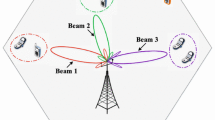Abstract
The issue of a multicast search for a group of users is discussed in this study. Given the condition that the search is over only after all the users in the group are found, this problem is called the Conference Call Search (CCS) problem. The goal is to design efficient CCS strategies under delay and bandwidth constraints. While the problem of tracking a single user has been addressed by many studies, to the best of our knowledge, this study is one of the first attempts to reduce the search cost for multiple users. Moreover, as oppose to the single user tracking, for which one can always reduce the expected search delay by increasing the expected search cost, for a multicast search the dependency between the delay and the search cost is more complicated, as demonstrated in this study. We identify the key factors affecting the search efficiency, and the dependency between them and the search delay. Our analysis shows that under tight bandwidth constraints, the CCS problem is NP-hard. We therefore propose a search method that is not optimal, but has a low computational complexity. In addition, the proposed strategy yields a low search delay as well as a low search cost. The performance of the proposed search strategy is superior to the implementation of an optimal single user search on a group of users.
Similar content being viewed by others
References
I.F. Akyildiz, J.S.M. Ho and Y.B. Lin, Movement based location update and selective paging schemes, IEEE/ACM Trans. on Networking 4(4) (1996)629–638.
I.F. Akyildiz, J. McNair, J.S.M. Ho, H. Uzunalioglu and W. Wang, Mobility management in next generation wireless systems, IEEE Proceedings Journal 87(8) (1999) 1347–1385.
A. Bar-Noy, I. Kessler and M. Sidi Mobile users: To update Or not to update? Wireless Networks 1(2) (1995) 175–185.
A. Bar-Noy and G. Malewicz, Establishing wireless conference calls under delay constraints, The 21th ACM Symp. on Principles of Distributed Computing (PODC), (2002) pp. 41–50.
A. Bhattacharya and S.K. Das, LeZi-update: An information-theoretic framework for personal mobility tracking in PCS networks, Wireless Networks 8(2/3) (2002) 121–135.
M.R. Garey and D.S. Johnson, Computers and Intractability: A Guide to the Theory of NP-Completeness. New York: W. H. Freeman (1979).
J.S.M. Ho and I.F. Akyildiz, Mobile user location update and paging under delay constraints, Wireless Networks 1(4) (1995) 413–425.
S. Madhavapeddy, K. Basu and A. Roberts, Adaptive paging algorithms for cellular systems, Wireless Information Networks: Architecture, Resource Management and Mobile Data (1996) pp. 83–101.
U. Madhow, L. Honig and K. Steiglitz, Optimization of wireless resources for personal communications mobility tracking, IEEE/ACM Trans. on networking 3(6) (1995) 698–707.
Z. Naor and H. Levy, LATS: A load-adaptive threshold scheme for tracking mobile users, IEEE/ACM Trans. on Networking 7(6) (1999) 808–817.
C. Rose, Minimizing the average cost of paging and registration: A timer-based method, Wireless Networks 2(2) (1996) 109–116.
C. Rose and R. Yates, Minimizing the average cost for paging under delay constraints, Wireless Networks 1(2) (1995) 211–219.
C. Rose and R. Yates, Ensemble polling strategies for increased paging capacity in mobile communication networks, Wireless Networks 3(2) (1997) 159–167.
EIA/TIA, Cellular Radio-Telecommunications Inter-system Operations, Tech. Rep. IS-41 Revision C (1995).
Author information
Authors and Affiliations
Corresponding author
Additional information
Amotz Bar-Noy received the B.Sc. degree in 1981 in Mathematics and Computer Science and the Ph.D. degree in 1987 in Computer Science, both from the Hebrew University, Israel. From October 1987 to September 1989 he was a post-doc fellow in Stanford University, California. From October 1989 to August 1996 he was a Research Staff Member with IBM T. J. Watson Research Center, New York. From February 1995 to September 2001 he was an associate Professor with the Electrical Engineering-Systems department of Tel Aviv University, Israel. From September 1999 to December 2001 he was with AT research labs in New Jersey. Since February 2002 he is a Professor with the Computer and Information Science Department of Brooklyn College - CUNY, Brooklyn New York.
Zohar Naor received the Ph.D. degree in Computer Science from Tel Aviv University, Tel Aviv, Israel, in 2000. Since 2003 he is with the University of Haifa, Israel. His areas of interests include wireless networks, resource management of computer networks, mobility, search strategies, and multiple access protocols.
Rights and permissions
About this article
Cite this article
Bar-Noy, A., Naor, Z. Efficient multicast search under delay and bandwidth constraints. Wireless Netw 12, 747–757 (2006). https://doi.org/10.1007/s11276-006-2499-3
Published:
Issue Date:
DOI: https://doi.org/10.1007/s11276-006-2499-3




